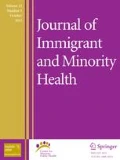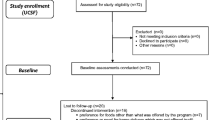Abstract
Racial/ethnic minorities are disproportionately affected by barriers to health care access and utilization. The primary objective was to test for an independent association between household food insecurity and health care access/utilization. In this cross-sectional survey, 211 Latinos (predominantly, Puerto-Ricans) with type 2 diabetes (T2D) were interviewed at their homes. Factor analyses identified four barriers for health care access/utilization: enabling factor, doctor access, medication access and forgetfulness. Multivariate logistic regression models examined the association between each of the barrier factors and food insecurity controlling for sociodemographic, cultural, psychosocial, and diabetes self-care variables. Higher food insecurity score was a risk factor for experiencing enabling factor (OR = 1.46; 95% CI = 1.17–1.82), medication access (OR = 1.26; 95 CI% = 1.06–1.50), and forgetfulness (OR = 1.22; 95 CI% = 1.04–1.43) barriers. Higher diabetes management self-efficacy was protective against all four barriers. Other variables associated with one or more barriers were health insurance, perceived health, depression, blood glucose, age and education. Findings suggest that addressing barriers such as food insecurity, low self-efficacy, lack of health insurance, and depression could potentially result in better health care access and utilization among low income Puerto-Ricans with T2D.
Similar content being viewed by others
References
Fiscella K, Franks P, Gold MR, Clancy CM. Inequality in quality: addressing socioeconomic, racial, and ethnic disparities in health care. JAMA. 2000;283:2579–84.
Lantz PM, House JS, Lepkowski JM, Williams DR, Mero RP, Chen J. Socioeconomic factors, health behaviors, and mortality: results from a nationally representative prospective study of US adults. JAMA. 1998;279:1703–8.
Vargas Bustamante A, Fang H, Rizzo JA, Ortega AN. Understanding observed and unobserved health care access and utilization disparities among US Latino adults. Med Care Res Rev. 2009;66:561–77.
Andersen R, Newman JF. Societal and individual determinants of medical care utilization in the United States. Milbank Mem Fund Q Health Soc. 1973;51:95–124.
Fiscella K, Franks P, Doescher MP, Saver BG. Disparities in health care by race, ethnicity, and language among the insured: findings from a national sample. Med Care. 2002;40:52–9.
Brown AF, Ettner SL, Piette J, Weinberger M, Gregg E, Shapiro MF, Karter AJ, Safford M, Waitzfelder B, Prata PA, Beckles GL. Socioeconomic position and health among persons with diabetes mellitus: a conceptual framework and review of the literature. Epidemiol Rev. 2004;26:63–77.
Vozoris NT, Tarasuk VS. Household food insufficiency is associated with poorer health. J Nutr. 2003;133:120–6.
Seligman HK, Bindman AB, Vittinghoff E, Kanaya AM, Kushel MB. Food insecurity is associated with diabetes mellitus: results from the National Health Examination and Nutrition Examination Survey (NHANES) 1999–2002. J Gen Intern Med. 2007;22:1018–23.
Stratton IM, Adler AI, Neil HA, Matthews DR, Manley SE, Cull CA, Hadden D, Turner RC, Holman RR. Association of glycaemia with macrovascular and microvascular complications of type 2 diabetes (UKPDS 35): prospective observational study. BMJ. 2000;321:405–12.
Standards of medical care in diabetes—2010. Diabetes Care 2010;33(Suppl 1):S11–S61.
Cook JT, Frank DA, Berkowitz C, Black MM, Casey PH, Cutts DB, Meyers AF, Zaldivar N, Skalicky A, Levenson S, Heeren T, Nord M. Food insecurity is associated with adverse health outcomes among human infants and toddlers. J Nutr. 2004;134:1432–8.
Campbell CC. Food insecurity: a nutritional outcome or a predictor variable? J Nutr. 1991;121:408–415.
Pérez-Escamilla R. Food insecurity and hunger in children: impact on physical and psycho-social development. In: Ross, CA, Caballero, B, Cousins, RJ, Tucker, KL, Ziegler, TR, editors. Modern nutrition in health and disease, 11th ed. Baltimore, MD: Lippincott Williams & Wilkins (In Press).
US census bureau: The Hispanic population 2010. Available at http://www.census.gov/prod/cen2010/briefs/c2010br-04.pdf. Accessed on September 12, 2011. 2011.
Coleman-Jensen A, Nord M, Andrews M, Carlson S. Household food security in the United States in 2010. Economic research report no. (ERR-125); 2011. p 37.
CDC: Centers for Disease Control and Prevention. Number and percentage of US population with diagnosed diabetes, 1980–2009. 2011. Available at http://www.cdc.gov/diabetes/statistics/prevalence_national.htm. Accessed on 12 Sept 2011.
CDC: Centers for Disease Control and Prevention. Diabetes complications, 1980–2009. 2011. Available at http://www.cdc.gov/diabetes/statistics/complications_national.htm. Accessed on 12 Sept 12 2011.
Fitzgerald N, Hromi-Fiedler A, Segura-Pérez S, Pérez-Escamilla R. Food insecurity is related to increased risk of type 2 diabetes among Latinas. Ethnicity Dis. 2011; (In Press).
Hargraves JL, Hadley J. The contribution of insurance coverage and community resources to reducing racial/ethnic disparities in access to care. Health Serv Res. 2003;38:809–29.
Arcury TA, Preisser JS, Gesler WM, Powers JM. Access to transportation and health care utilization in a rural region. J Rural Health. 2005;21:31–8.
Neal RD, Hussain-Gambles M, Allgar VL, Lawlor DA, Dempsey O. Reasons for, consequences of missed appointments in general practice in the UK: questionnaire survey, prospective review of medical records. BMC Fam Pract. 2005;6:47.
Perez-Escamilla RVLS, Damio G, Segura-Pérez S, Fernandez ML, Calle MC, Kollannoor-Samue G, Chhabra J, D’Agostino D. Short and long term impacts of diabetes peer counseling on HbA1c among Latinos: Preliminary results FASEB J 2009; 23:336–338.
Kollannoor Samuel G, Wagner J, Damio G, Segura-Pérez S, Chhabra J, Vega-López, S, Pérez-Escamilla R. Social support modifies the association between household food insecurity and depression among Latinos with uncontrolled type 2 diabetes. J Immi Minor Health 2011; (In Press).
Blumberg SJ, Bialostosky K, Hamilton WL, Briefel RR. The effectiveness of a short form of the household food security scale. Am J Public Health. 1999;89:1231–4.
Zimet GD, Dahlem NW, Zimet SG, Zimet SG, Zimet SG, Farley GK. The multidimensional scale of perceived social support. J Pers Assess. 1988;52:30–41.
Kollannoor-Samuel G, Wagner J, Damio G, Segura-Perez S, Chhabra J, Vega-Lopez S, Perez-Escamilla R. Social support modifies the association between household food insecurity and depression among Latinos with uncontrolled type 2 diabetes. J Immigr Minor Health 2011.
Radloff LS. The CES-D Scale: a self-report depression scale for research in the general population. App Psych Meas 1977; 1:385–401.
Ye X, Lai CQ, Crott JW, Troen AM, Ordovas JM, Tucker KL. The folate hydrolase 1561C > T polymorphism is associated with depressive symptoms in Puerto Rican adults. Psychosom Med. 2011;73:385–92.
Vera M, Alegria M, Freeman D, Robles RR, Rios R, Rios CF. Depressive symptoms among Puerto Ricans: island poor compared with residents of the New York City area. Am J Epidemiol. 1991;134:502–10.
Crockett LJ, Randall BA, Shen YL, Russell ST, Driscoll AK. Measurement equivalence of the center for epidemiological studies depression scale for Latino and Anglo adolescents: a national study. J Consult Clin Psychol. 2005;73:47–58.
Cuellar I, Arnold B, Maldonado R. Acculturation rating-scale for Mexican-Americans Ii—a revision of the original arsma scale. Hispanic J Beh Sci. 1995;17:275–304.
Cuellar I, Arnold B, Maldonado R. Acculturation rating-scale for Mexican-Americans II—a revision of the original ARSMA scale. Hisp J Behav Sci. 1995;17:275–304.
Teichman JR, Contreras-Grau JM. Acculturation and teaching styles among young mainland Puerto Rican mothers. Hisp J Behav Sci. 2006;28:84–101.
Garcia L, Hurwitz EL, Kraus JF. Acculturation and reported intimate partner violence among Latinas in Los Angeles. J Interpers Violence. 2005;20:569–90.
DeSalvo KB, Bloser N, Reynolds K, He J, Muntner P. Mortality prediction with a single general self-rated health question. A meta-analysis. J Gen Intern Med. 2006;21:267–75.
Anderson RM, Fitzgerald JT, Funnell MM, Gruppen LD. The third version of the diabetes attitude scale. Diabetes Care. 1998;21:1403–7.
Fitzgerald JT, Funnell MM, Hess GE, Barr PA, Anderson RM, Hiss RG, Davis WK. The reliability and validity of a brief diabetes knowledge test. Diabetes Care. 1998;21:706–10.
Talbot F, Nouwen A, Gingras J, Gosselin M, Audet J. The assessment of diabetes-related cognitive and social factors: the multidimensional diabetes questionnaire. J Behav Med. 1997;20:291–312.
Goodman E, Dolan LM, Morrison JA, Daniels SR. Factor analysis of clustered cardiovascular risks in adolescence: obesity is the predominant correlate of risk among youth. Circulation. 2005;111:1970–7.
Briesacher BA, Ross-Degnan D, Wagner AK, Fouayzi H, Zhang F, Gurwitz JH, Soumerai SB. Out-of-pocket burden of health care spending and the adequacy of the medicare part D low-income subsidy. Med Care. 2010;48:503–9.
Medicare: Medicare Benefits. http://www.medicare.gov/navigation/medicare-basics/medicare-benefits/medicare-benefits-overview.aspx. 2011.
Soumerai SB, Ross-Degnan D. Inadequate prescription-drug coverage for medicare enrollees—a call to action. New Eng J Med. 1999;340:722–8.
Ma CT, Gee L, Kushel MB. Associations between housing instability and food insecurity with health care access in low-income children. Ambul Pediatr. 2008;8:50–7.
Seligman HK, Laraia BA, Kushel MB. Food insecurity is associated with chronic disease among low-income NHANES participants. J Nutr 140:304–310.
Center for Disease Control and Prevention. Health of Hispanic or Latino population: summary health statistics for the US population: national health interview survey, 2009, Appendix III, Table XVI. 2009. Available at http://www.cdc.gov/nchs/fastats/hispanic_health.htm. Accessed on 11 March 2011.
Griffith LS, Field BJ, Lustman PJ. Life stress and social support in diabetes: association with glycemic control. Int J Psychiatry Med. 1990;20:365–72.
Wang JS, Wang RH, Lin CC. [Self-care behaviors, self-efficacy, and social support effect on the glycemic control of patients newly diagnosed with non-insulin-dependent diabetes mellitus]. Kaohsiung J Med Sci. 1998;14:807–15.
Sarkar U, Fisher L, Schillinger D. Is self-efficacy associated with diabetes self-management across race/ethnicity and health literacy? Diabetes Care. 2006;29:823–9.
Aljasem LI, Peyrot M, Wissow L, Rubin RR. The impact of barriers and self-efficacy on self-care behaviors in type 2 diabetes. Diabetes Educ. 2001;27:393–404.
Kollannoor-Samuel G, Chhabra J, Fernandez ML, Vega-Lopez S, Perez SS, Damio G, Calle MC, D’Agostino D, Perez-Escamilla R. Determinants of fasting plasma glucose and glycosylated hemoglobin among low income Latinos with poorly controlled type 2 diabetes. J Immigr Minor Health.
Jorm AF. History of depression as a risk factor for dementia: an updated review. Aust N Z J Psychiatry. 2001;35:776–81.
Potter GG, Steffens DC. Contribution of depression to cognitive impairment and dementia in older adults. Neurologist. 2007;13:105–17.
Acknowledgment
This study was funded and supported by the Connecticut NIH Export Center for Eliminating Health Disparities among Latinos (NIH- NCMHD grant # P20MD001765). We would like to thank all study participants and community health care workers at the Hispanic Health Council. The content is solely the responsibility of the authors and does not necessarily represent the official views of the National Center on Minority Health and Health Disparities or the National Institutes of Health.
Author information
Authors and Affiliations
Corresponding author
Rights and permissions
About this article
Cite this article
Kollannoor-Samuel, G., Vega-López, S., Chhabra, J. et al. Food Insecurity and Low Self-efficacy are Associated with Health Care Access Barriers Among Puerto-Ricans with Type 2 Diabetes. J Immigrant Minority Health 14, 552–562 (2012). https://doi.org/10.1007/s10903-011-9551-9
Published:
Issue Date:
DOI: https://doi.org/10.1007/s10903-011-9551-9



